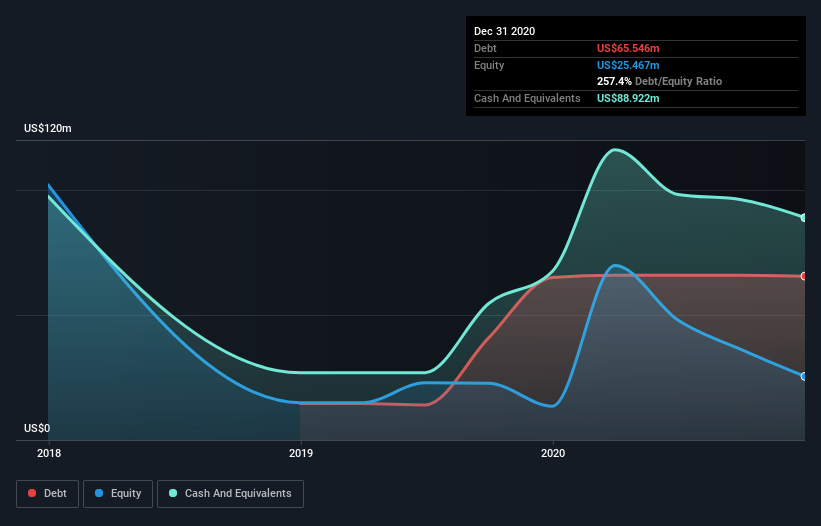Is Casper Sleep (NYSE:CSPR) Using Debt In A Risky Way?
Some say volatility, rather than debt, is the best way to think about risk as an investor, but Warren Buffett famously said that 'Volatility is far from synonymous with risk.' It's only natural to consider a company's balance sheet when you examine how risky it is, since debt is often involved when a business collapses. We note that Casper Sleep Inc. (NYSE:CSPR) does have debt on its balance sheet. But the real question is whether this debt is making the company risky.
When Is Debt A Problem?
Generally speaking, debt only becomes a real problem when a company can't easily pay it off, either by raising capital or with its own cash flow. If things get really bad, the lenders can take control of the business. However, a more common (but still painful) scenario is that it has to raise new equity capital at a low price, thus permanently diluting shareholders. Having said that, the most common situation is where a company manages its debt reasonably well - and to its own advantage. When we think about a company's use of debt, we first look at cash and debt together.
See our latest analysis for Casper Sleep
What Is Casper Sleep's Debt?
As you can see below, Casper Sleep had US$65.5m of debt, at December 2020, which is about the same as the year before. You can click the chart for greater detail. But it also has US$88.9m in cash to offset that, meaning it has US$23.4m net cash.
How Healthy Is Casper Sleep's Balance Sheet?
We can see from the most recent balance sheet that Casper Sleep had liabilities of US$119.3m falling due within a year, and liabilities of US$89.5m due beyond that. Offsetting these obligations, it had cash of US$88.9m as well as receivables valued at US$32.8m due within 12 months. So its liabilities outweigh the sum of its cash and (near-term) receivables by US$87.0m.
This deficit isn't so bad because Casper Sleep is worth US$352.6m, and thus could probably raise enough capital to shore up its balance sheet, if the need arose. But we definitely want to keep our eyes open to indications that its debt is bringing too much risk. While it does have liabilities worth noting, Casper Sleep also has more cash than debt, so we're pretty confident it can manage its debt safely. When analysing debt levels, the balance sheet is the obvious place to start. But it is future earnings, more than anything, that will determine Casper Sleep's ability to maintain a healthy balance sheet going forward. So if you're focused on the future you can check out this free report showing analyst profit forecasts.
Over 12 months, Casper Sleep reported revenue of US$497m, which is a gain of 13%, although it did not report any earnings before interest and tax. That rate of growth is a bit slow for our taste, but it takes all types to make a world.
So How Risky Is Casper Sleep?
We have no doubt that loss making companies are, in general, riskier than profitable ones. And we do note that Casper Sleep had an earnings before interest and tax (EBIT) loss, over the last year. And over the same period it saw negative free cash outflow of US$64m and booked a US$90m accounting loss. With only US$23.4m on the balance sheet, it would appear that its going to need to raise capital again soon. Summing up, we're a little skeptical of this one, as it seems fairly risky in the absence of free cashflow. When analysing debt levels, the balance sheet is the obvious place to start. However, not all investment risk resides within the balance sheet - far from it. Case in point: We've spotted 4 warning signs for Casper Sleep you should be aware of.
At the end of the day, it's often better to focus on companies that are free from net debt. You can access our special list of such companies (all with a track record of profit growth). It's free.
This article by Simply Wall St is general in nature. It does not constitute a recommendation to buy or sell any stock, and does not take account of your objectives, or your financial situation. We aim to bring you long-term focused analysis driven by fundamental data. Note that our analysis may not factor in the latest price-sensitive company announcements or qualitative material. Simply Wall St has no position in any stocks mentioned.
Have feedback on this article? Concerned about the content? Get in touch with us directly. Alternatively, email editorial-team (at) simplywallst.com.

